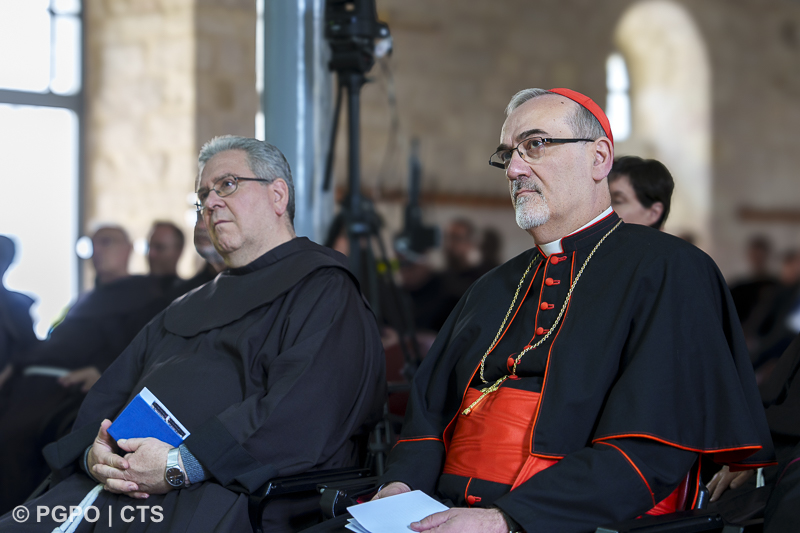
The Franciscan community of Jerusalem met on Monday 13 May at the Auditorium of the Our Lady of the Immaculate Conception at St Saviour’s Convent in Jerusalem to celebrate the hundredth anniversary of the foundation of the Studium Biblicum Franciscanum (the live broadcast of the event, curated by the CMC, can be found here) through the accounts and the words of academics and illustrious ex-students.
“There could not have been a happier date on which to celebrate this anniversary than the day of Our Lady of Fatima,” said Fra Rosario Pierri, Dean of the Studium Biblicum Franciscanum, at the beginning of his message of greetings. “We are here today to complete the celebrations for the centenary of the Foundation of the Studium Biblicum, because after the meeting with the Pope in the Vatican and after the Conference in Rome at the Antonianum University, there had to be this meeting here as well, in the Holy City, to share the joy of the commemoration with those who were unable to go to Rome.”

Unfortunately, due to the meteorological calamity that has struck Brazil in recent days, Mons. Jaime Spengler, President of the Brazilian Episcopal Conference, a former student of the Studium Jerosolimitanum, could not be present in person. In a video message – which Fra Pierri defined a “touching account from a pastor who is sharing the pain and the problems with the flock that he has been entrusted with” – Mons. Spengler wanted to thank the SBF and remember how his studies at the Faculty were “an opportunity that has given me the strength to persevere in the form of life chosen.”

In his speech, the Custos of the Holy Land, Fra Francesco Patton, highlighted how the Custody “had the courage to start this work linked to studying the Word of God and archaeological research at a truly difficult time.” The Studium Biblicum “was founded as part of the Custody and then grew up as a development of the Custody. I would like to recall the pontifical mandate of the 1342 “Gratiam agimus” bull of Clement VI, where the Pope, in entrusting us with the Custody of the Holy Places, asked the Friars Minor to do three things: to dwell in the Holy Places, to celebrate “sung Masses and divine offices” in the Holy Places and to be an international community, exactly what the reality of the lecturers and students of the Flagellation is today.” The Father Custos then underlined the continuous need for courage, “to invest,” he said, “above all in people, because it is people who make institutions and not the other way round. And there is a need for courage to invest in what allows keeping us up to date with the times and looking at the future.”

Cardinal Pierbattista Pizzaballa then shared “the grace of having lived his first ten years in the Holy Land at the Studium Biblicum, a period of “incubation” which was decisive for my story. From the love that shone out from those lecturers, most of whom have left us now, I learned to rest my head on these stones and love the Scriptures, because love is always infectious.”

“At a time when modern science was critically arguing about the Holy Places and questioned the historical-theological base on which the Church was founded,” the Patriarch continued, “the Studium Biblicum gradually and patiently scientifically proved what the Church has always believed: i.e. that the places where the Word became flesh were not the work of “sophisticated devotionalism” but the result of a coherent, serious and solid tradition. With the instruments of modern science, the SBF has linked the Christian faith to a place, to a land and to a story, once and for all.”

Fra Alessandro Coniglio, a lecturer in Exegesis at the SBF, then offered those present an excursus of the academic activities of the SBF through the description of the publications in the various collections (Collectio Maior, Collectio Minor, Analecta) which the Studium has curated over the years, from the different historical, exegetic and archaeological points of view. “We have to understand,” Fra Alessandro Coniglio emphasized, “what motivated our predecessors in these studies, so that we could increase their inspiration and the long tradition of faith and science could become a beacon of light that can enlighten us in the future.”

In the second part of the morning, Prof. Giuseppe Buffon, Deputy Rector of the Pontifical Antonianum University, gave an excellent lecture entitled “Return to Jerusalem”, in which he went over the history of the foundation of the SBF, following in particular the bond with the ecclesiastical institutions and its international intertwining with Rome, highlighting the political and civil aspects of a reality which – in particular with the specialization in archaeology – has contributed to giving a direction to the exegetic studies.

Lastly, Father Olivier Poquillon, Director of the École Biblique et Archéologique Française and Prof. Augustin Hernandéz Vidales, Magnificent Rector of the Pontifical Antonianum University, recalled the importance of the commitment of this institution to the in-depth study of the Word of God, carried on by Franciscans who are not only “spreaders of the word” but attentive and passionate scholars of the Holy Scripture.
At the end of the Conference, Fra Rosario Pierri distributed to the authorities present the commemorative medal with the logo of the Centenary, created for the occasion by Fra Amedeo Ricco, the archaeologist of the Custody.
Silvia Giuliano
